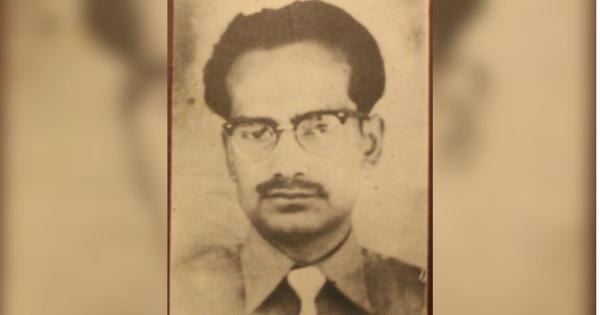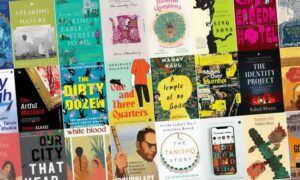
Nirmal Padmavat resembled one of those black idols of Greek warriors, while Prabhaschandra Niyogi emanated the essence of the white idols of Greek philosophers. Neither of them was modern, nor did they keep themselves up-to-date.
Nirmal was sitting in the drawing room when Niyogi, dressed in a white pajama and white silk kurta, white attire and a whiteness draped around his face, arrived. Nirmal stood up and smiled. His bright white teeth were shining. Niyogi, eschewing formalities, cut straight to the point, posing a direct question, “I received your cable from New York. You were there on the fourth day!”
“I only came yesterday. I will stay here from now. I had written to you…” Nirmal replied. Niyogi gazed at him sharply. He wanted to scrutinize Nirmal to ensure that the latter wasn’t pretending. There was a firmness in his voice and honesty in his eyes. He wasn’t sceptical; in fact, he believed and had faith in his own strength. “I haven’t read your letter … Tell me, what’s the matter?” he asked sweetly.
“You must not have found the time.”
“I don’t have time … Look, I have a 9 pm flight to Bombay. Whatever you want to say … What’s the matter?”
“I know you are going to Bombay and that you will be back on Saturday.”
“What is the matter?”
Despite Niyogi’s clear indifference, Nirmal refused to be belittled. He stood his ground, not accepting Niyogi’s tone as an insult. He said, “I’ll tell you. I will take 10-15 minutes of your time, not much. You please listen to me…”
Nirmal was born in a small village in North Bihar. After his father’s demise, his mother sold the ancestral house and eloped with a lorry driver. He was a boy of only ten at that time. Surprisingly, Nirmal didn’t feel sorrow for his mother’s departure; instead, the pain stemmed from the sale of the family home. He rationalised her leaving as her needing a man, that it was fair for her to go, but the perplexing question remained – why did she take the house with her?
After running away from the village, Nirmal went straight to Karachi. From Karachi to Lahore. He earned his livelihood by washing dishes in a Muslim hotel in Sialkot. Then he became a waiter in the same hotel. He would get the evening shift from four till midnight, waiting tables. “Bring the kaleji, bring the tandoori.” “O black boy, what are you doing, bring a packet of Kainchi cigarettes.” He had befriended a maulana who sold perfume and was very fond of the latter’s green beard.
However, one day, Maulana Israrul Haq invited him to his room, and once there, Nirmal brandished a knife – a vegetable cutter. Following this unsettling incident, no man dared to take him to their room. Maulana said to Fateh Singh, the owner of the hotel, in front of all the customers, “I swear, this boy of yours is the son of a bastard, Badshah. I treated him like a son, my friends, and he threatened me with a knife…” People sitting at the tables of the hotel reiterated, “Today’s children are like this, Maulana! They don’t even value their father’s love!”
Nirmal would juggle his job at the hotel in the evenings with selling newspapers in the morning and afternoon. He would ingeniously craft paper bags, toys and flowers from old newspapers. After a few days, he started a newspaper stall on Azad Road. In those days, Azad Road was named Isabella Road. Isabella was the wife of an English commissioner. Notably, Isabella was apprehended by Bhagat Singh’s associates on this very road, and that self-respecting English girl chose not to return to her husband. Rumour has it that she joined forces with the same revolutionaries who had detained her.
“I have never been to Sialkot,” Prabhaschandra Niyogi said. “But it is pure coincidence that I met Isabella Rutherford, right here in Calcutta. In those days, I used to work with Seth Jamnadas Harnamdas. Isabella had come to collect donations for her Shakti Ashram. Do you know, Nirmal? After deserting the revolutionaries, that English girl fell prey to witchcraft.”
Nirmal started smiling. “I know. I know everything about Isabella,” he said, as if reminiscing about a past romance.
Along with a small stall of newspapers and magazines, he also opened a tea stall. He himself started studying Urdu and Hindi with the help of a Maulvi. At his shop, Congressmen, revolutionaries, Muslim League leaders, Arya Samajis, all would sit side by side drinking tea and discussing politics. However, one day, the police arrived, claiming that Nirmal’s shop served as a base for revolutionary activities. Materials used for crafting crude bombs were reportedly seized from Nirmal, resulting in a four-year sentence for him.
In jail, Nirmal found himself in the company of thieves, dacoits and public leaders. It was here that he grasped the importance of acquiring knowledge and experience. Prompted by the question of what he truly wanted, Nirmal embarked on a journey of studying economics and history under the guidance of Congress leaders. He realised that the common goal of law, religion, science and politics was to bring happiness and prosperity to humanity. Any system or regime that impoverished and crippled people needed to be dismantled. To Nirmal, Aristotle and Karl Marx stood as examples of perfect individuals, embodying ideals that inspired him during his time in jail.
After his release, Nirmal went to Bombay. He travelled the whole world as a waiter in the canteen of a cargo ship. Tokyo, Hong Kong, Peking, Moscow, Warsaw, Budapest, Berlin, Vienna, Paris. During his voyages, he witnessed the ravages of the World War II, observing Europe being torn apart in both the Great War and the Second World War. He also encountered the aftermath of the rogue Nazi regime in Germany, with the infamous Berlin Wall serving as a poignant symbol of human folly. Soldiers from Britain, France and Germany found it challenging to reintegrate into civilian life. The whole of Europe seemed to be walking on broken glass, on pavements crammed with corpses.
In Paris, older prostitutes and affluent widows immersed themselves in the melancholy tales of Kafka and the old poems of Paul Valéry, shedding tears for a bygone era that once boasted of Napoleon and a mighty queen. Meanwhile, intellectuals in Oxford and London, seeking solace from the tumultuous world, recited verses from the Bible beneath the shadow of beer bottles. Nirmal, having spent considerable time in America, decided to pause his travels. It was now time to sit somewhere for a while and think about building a house – a place adorned with pots of seasonal flowers on the balcony.
The goddess of liberty was standing on the beach of New York with a flaming torch in her hands, the crown on her head adorned with spikes representing rays of the sun. Nirmal was mesmerised. When he met Isabella on the porch of the Ridge Hotel for the first time in his life, he considered his dark complexion his strength and that it served his self-interest. While talking to Kalyani, he realised that Bernard Shaw was not wrong and had written the true story of the daunted fourteen-fifteen-year-old girl, Cleopatra, and the 55-year-old warlord, Julius Caesar, hiding under the shield of the Sphinx… Nirmal was enchanted and intoxicated.
Nirmal studied America’s economy in this state of intoxication. He tried to study and comprehend things pertaining to labour, production, capital, distribution, dividends, free trade and calculation of government taxes. As he surveyed the high offices, he couldn’t help but notice the seemingly insignificant individuals who lacked a clear understanding of their existence. These men were oblivious to the reasons behind their life and death, as well as the nature of their sins.
Excerpted with permission from The Dead Fish, Rajkamal Choudhary, translated from the Hindi by Mahua Sen, Rupa Publications.
📰 Crime Today News is proudly sponsored by DRYFRUIT & CO – A Brand by eFabby Global LLC
Design & Developed by Yes Mom Hosting






